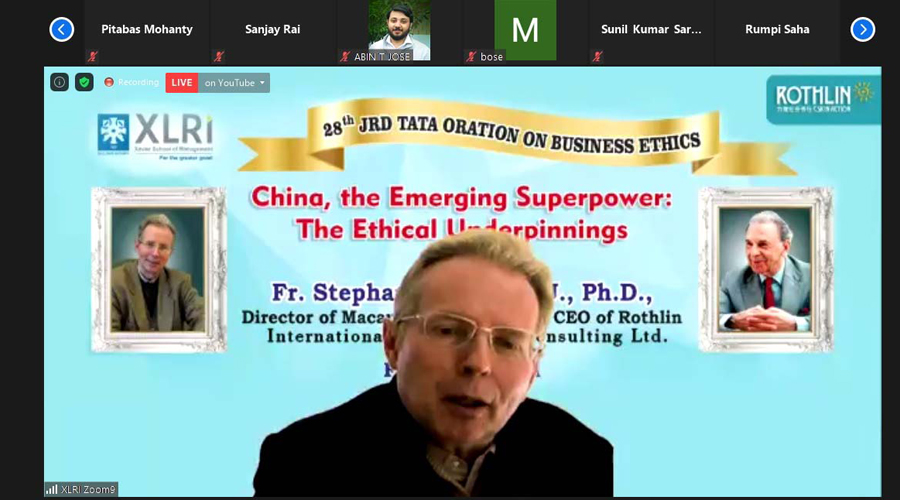XLRI hosted the 28th Annual JRD Tata Oration on Business Ethics virtually on Saturday. Fr. Stephan Rothlin, director of the Macau Ricci Institute and CEO of Rothlin International Management Consulting Ltd delivered the oration.
Fr. Rothlin delivered his speech on the topic – China - The Emerging Superpower, The Ethical Underpinnings.
He emphasised on the ethical perspectives and explained the key elements of business ethics, which he has been teaching in business schools in Beijing, Hong Kong, Macau, Singapore, and Taiwan for the last 23 years.
He also shared his insights about business ethics in China. “Case studies should be used as the most effective pedagogy for business ethics. Business schools should combine both the wisdom and traditions of India and China to cultivate moral virtues,” he said.
Talking about China’s dramatic economic transformation, he referred to the data from the 2019 and 2020 Organisation for Economic Co-operation and Development (OECD) economic survey and shared some outstanding figures vis-à-vis the growth of China.
“The growth has slowed in the first half of 2020 but remains strong. China has managed to control Covid-19 pandemic and will remain the major driver of global growth, as is reflected by China’s significantly high GDP growth,” he said.
In his oration, he also pointed out that China witnessed enormous trade frictions, which hurt not only both sides but also the global economy.
“China has made impressive gains claiming to have lifted 700 million people out of poverty in 40 years since the open door policy. China should be given credit for the alleviation of mass poverty and handling the Covid-19 crisis very well after initial failures. If China manages to opt for a more sustainable economic growth, it would significantly impact the world economy,” he added.
Earlier, in his welcome address, Fr. P. Christie, director of XLRI said, “Globalisation has further enhanced the importance of ethical, moral compass in business. Globalisation means that business strategy and business ethics cannot be separated from each other. Corporations have entered a new era, the ‘prove-to-me’ era. Unethical practices and organizations are not being shrugged off anymore. Even reputed organisations and some outstanding CEOs are named, shamed and fined, or imprisoned for their ethical lapses the world over. The culture of an organisation is established by the tone set at the top. Chief executives must lead by example.”
He went on to say that the B-school has always emphasised the importance of adopting an ethical code of conduct within the corporate world.
“We believe that no management education curriculum is entirely complete unless and until the students are instilled with a set of values that are necessary decision-making ingredients for the corporate manager today,” he said further.
In 1991, XLRI, in association with a few select Tata Group Companies, established the XLRI-JRD Tata Foundation for Business Ethics to mark their long-standing commitment and contribution to business ethics in India.
The foundation seeks to address itself by publicly affirming the imperative need for adopting ethics in business and striving to shape an enabling eco-system to foster ethical business practices.
JRD Tata, himself a role model extraordinary, set the bar high for the successive ethics orations for over two decades as the first orator.










